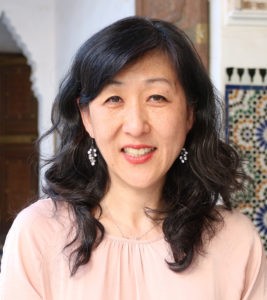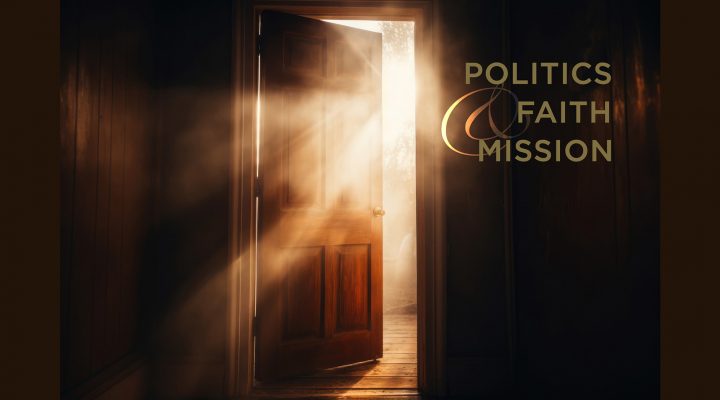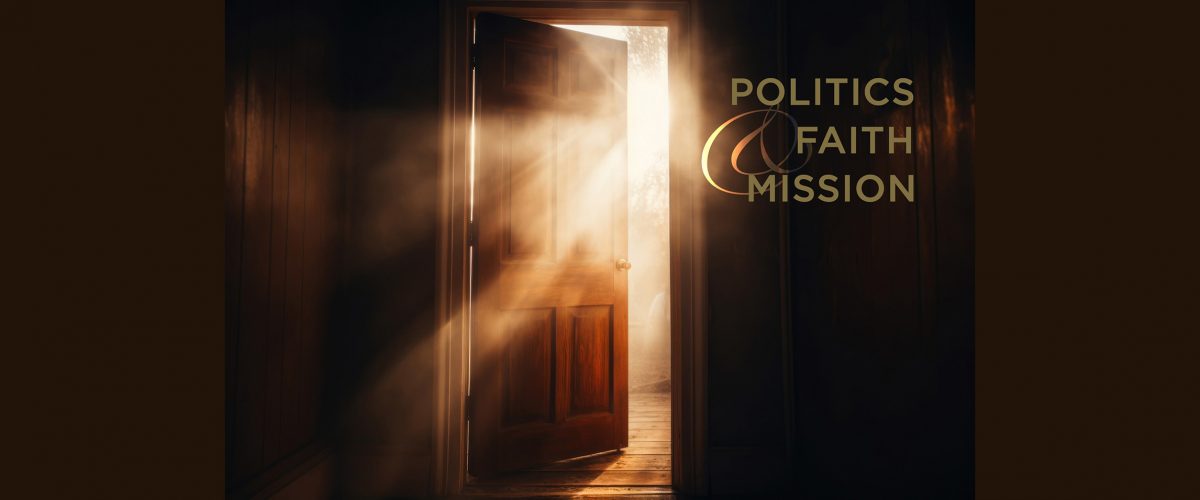Grace Ji-Sun Kim is professor of theology at Earlham School of Religion, host of the Madang Podcast, an ordained pastor in the Presbyterian Church (USA) and a prolific and much-respected author and public theologian. Her most recent book is When God Became White: Dismantling Whiteness for a More Just Christianity, and she was kind enough to take my questions before departing for a speaking tour for the book. I’m grateful for her work and for these responses.
Greg Garrett: Your new book When God Became White is a moving and useful look at how white Europeans created race and weaponized whiteness, including within Christianity. I hope by now my readers understand that race is a social construct, but can you talk a bit about why racial myths and symbols matter when it comes to how we imagine God and Jesus?

Grace Ji-Sun Kim
Grace Ji-Sun Kim: Racial myths and symbols matter when it comes to how we imagine God and Jesus as it impacts society’s views, behaviors, ethics and actions. Race is a social construct but people have used it as a biological reality to show how “one race” is better or superior to another race. When we do this, it allows racism to thrive, which in turn creates dramatic problems for people of color.
If society continues to perpetuate this myth, it will continue to talk about a white male God to reinforce whiteness and white privilege. Consequently, a white male God allows white people to continue to hold their power in society and allows domination over people of color. It is a cycle that feeds off each concept to perpetuate racism.
Racism is dangerous. It has allowed genocides to occur, the enslavement of Africans to be legitimated, the indenturing of Asian workers, the taking of land from Mexico, and other horrific events. Therefore, we must work toward dismantling a white male God that allows such atrocities to occur and work toward a nongendered and nonracialized understanding of God.
GG: I’m very interested in how we understand intersectionality and how we push back against white male privilege wherever it oppresses. You identify yourself in your book as a “Korean, straight, able-bodied, educated, immigrant woman.” You’re also a female theologian in an academy still top heavy with white men and in a social media culture riddled with “theo-bros.” Where do you find yourself facing prejudice and pushback these days? How can an understanding of intersectionality help us build solidarity and work toward a more just church and society?
GJSK: Intersectionality shows us that different areas of social injustices such as economic, racial, gender, climate, sexuality, ableism and religion all intersect to cause further oppression against people, especially women of color. Therefore, intersectionality becomes a powerful tool to help us make sense of what is happening in our culture, society and church. The numerous injustices intersect to compound the different oppressions and create new intersecting oppressions.
“Intersectionality becomes a new lens to view the world.”
Intersectionality becomes a new lens to view the world. This will help us tackle the different forms of injustice and help us understand that when we work on one issue, we are also working on other issues. Intersectionality shows there is no hierarchy of oppression and they are all oppressive. Intersectionality wants us to move away from dualism. Dualism has been embedded into Christianity from its beginnings, as Christianity was heavily influenced by Greco-Roman philosophy.
Dualism has been harmful as it separates and divides the world into two. We need to recognize that issues are not always separate or in their silos, but are complex, intersecting, messy, and are “both/and” rather than falling into simple dualism. Recognizing and understanding how intersectionality plays out in the world helps us work toward creating new realities of justice and love.
GG: I’m asking most of my interview subjects about white Christian nationalism and any concerns they and their communities have about it. Does this movement seem more dangerous now than in years past? And what can faithful Christians do to push back against it? (The final chapter in When God Became White offers great suggestions for anti-racism work, by the way.)
GJSK: We need to be concerned about Christian nationalism as it impacts our present society. However, it isn’t a new phenomenon, as we see it even in the Bible where many people came to Jesus to confront him, members of the government and rulers. The Herodians and the Pharisees approached Jesus and argued about the power of the Roman emperor.
We see this clearly in the question of paying taxes to Caesar or not (Matthew 22:15-22). When people confronted Jesus, he made it clear the government or the ruling parties were just the government and nothing more. Jesus told the confronters the government is part of this world, not part of the kin-dom of God.
“The way Jesus approached the rulers of his time is very different from how Americans are treating politics and the rise of Christian nationalism.”
The way Jesus approached the rulers of his time is very different from how Americans are treating politics and the rise of Christian nationalism. Christian nationalism is the understanding that America should be a Christian theocracy and that the government should take active steps to keep it that way. “Theocracy” comes from the Greek which means “government by God.” This means the country is governed by a government that derives its authority directly from religion.
To some Christians, this sounds like a lovely way to have politics and Christianity together to help influence government. But the reality is it is a white Christianity that pushes white people’s agenda to the detriment of people of color. It presents a white Christianity that legitimizes white supremacy, white privilege and the oppression of people of color.
This is why Christian nationalism is so dangerous. It serves only those very few at the top of the economic and social ladder who are up there due to their gender and their skin color.
We need to provide alternative ways of being faithful and becoming faithful loving communities that seek to help the marginalized and the disenfranchised. We need to build a welcoming and loving kin-dom of God, which is far from what Christian nationalism hopes to achieve.
GG: This year I’ve talked to people from a wide spectrum of identities and political leanings, but one thing they’ve all had in common so far is that they oppose Trumpism on religious and moral grounds. Yet I know — and am related to — churchgoers who will vote for Donald Trump this November and who have evolved a set of rationales for supporting him. We’re always told we shouldn’t talk about race, religion or politics, but it seems this year these are the things that most need to be discussed! What kinds of exchanges have you had with Trump evangelicals? Is there solidarity we might find with them while still remaining true to our calls to do justice, love mercy and walk humbly with our God?
“We need to name racism as a sin and not accept it as anything else.”
GJSK: I have met many Trump evangelicals who believe their form of Christianity is the truth. We need to see and talk about how it isn’t the good news, about how it does nothing to help the poor, the marginalized and the disenfranchised. Rather, it upholds a white male God and continues to legitimize white supremacy and white privilege. We need to name racism as a sin and not accept it as anything else.
I don’t believe we need to be in solidarity with those who preach a false gospel. Rather, we need to work on exposing and dismantling such untruths and seek to preach the good news of love, liberation, mercy, kindness and goodness.
GG: I asked our friend Brian McLaren a few weeks back — English teacher to English teacher — what he was reading that was teaching him or giving him hope, and I wonder if you have things you’re reading, watching, listening to or experiencing just now that are reminding you that we live in a resurrection world? Thanks so much for teaching us.
GJSK: I am reading lots of books by scholars and theologians of color. It is important to read books by people who have been marginalized, oppressed and subordinated, since they provide different insights and perspectives on God and the world.
These new insights are freeing, empowering and important, as they teach us that God is not a white male God and show this concept isn’t even biblical. No one has ever seen God. Therefore, we are only using metaphors and words to help us articulate the divine. All words fall short of describing the mystery of God.
We also need to remember that metaphors are just metaphors. These words are not God. Theologians from around the world and scholars of color provide new perceptions of God that are lifegiving and liberating. I hope many will read more books by women and people of color.
Greg Garrett teaches creative writing, film, literature and theology classes at Baylor University. He is the author of two dozen books of fiction, nonfiction, memoir and translation, including the critically acclaimed novels Free Bird, Cycling, Shame and The Prodigal. His latest novel is Bastille Day. He is one of America’s leading voices on religion and culture. Two of his recent nonfiction books are In Conversation: Rowan Williams and Greg Garrett and A Long, Long Way: Hollywood’s Unfinished Journey from Racism to Reconciliation. He is a seminary-trained lay preacher in the Episcopal Church. He lives in Austin with his wife, Jeanie, and their two daughters.
More from this series:
Politics, faith and mission: A conversation with Rowan Williams
Politics, faith and mission: A conversation with Nathaniel Jung-Chul Lee
Politics, faith and mission: A conversation with Starlette Thomas
Politics, faith and mission: A conversation with Samuel Perry
Politics, faith and mission: A conversation with Jimi Calhoun
Politics, faith and mission: A conversation with David Dark
Politics, faith and mission: A conversation with Randolph Hollerith
Politics, faith and mission: A conversation with Jillian Mason Shannon
Politics, faith and mission: A conversation with Bishop Mariann Edgar Budde
Politics, faith and mission: A conversation with Vann Newkirk II
Politics, faith and mission: A conversation with Sarah McCammon
Politics, faith and mission: A conversation with Winnie Varghese
Politics, faith and mission: A conversation with Kaitlyn Schiess
Politics, faith and mission: A conversation with Russell Moore
Politics, faith and mission: A BNG interview series on the 2024 election and the Church
Politics, faith and mission: A talk with Tim Alberta on his book and faith journey
Politics, faith and mission: A conversation with Jemar Tisby
Politics, faith and mission: A conversation with Leonard Hamlin Sr.
Politics, faith and mission: A conversation with Ty Seidule
Politics, faith and mission: A conversation with Jessica Wai-Fong Wong
Politics, faith and mission: A conversation with Brian McLaren


